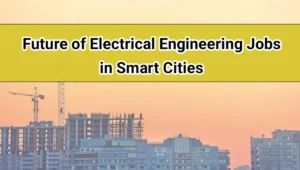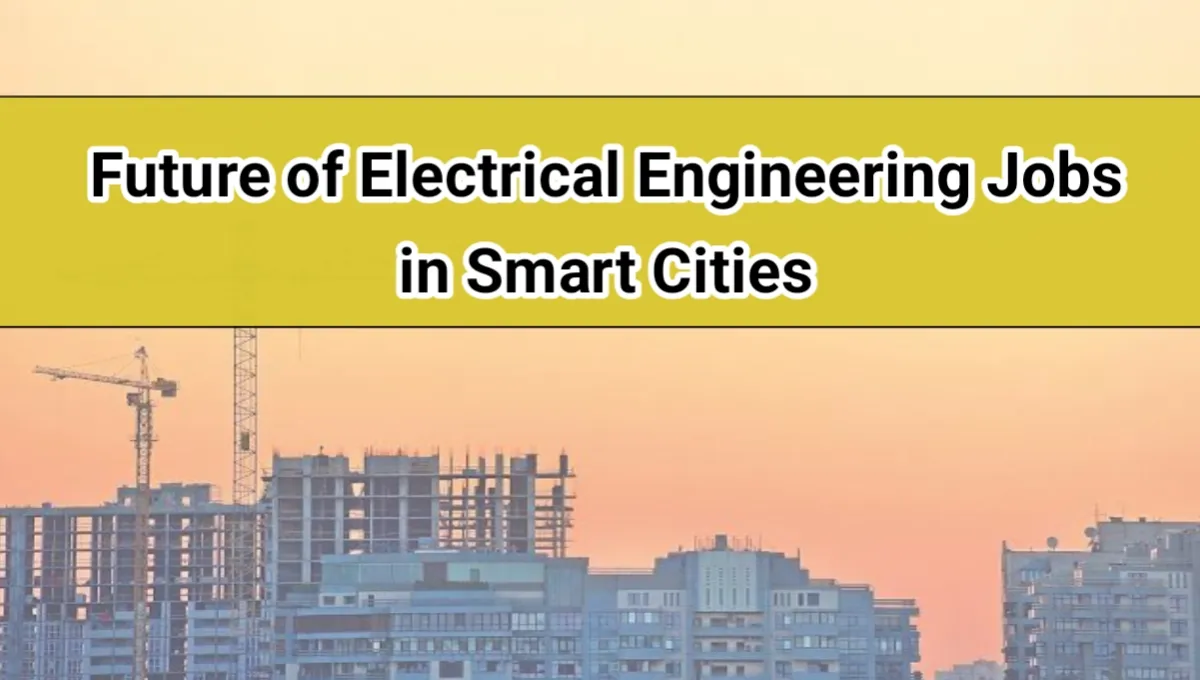Future of Electrical Engineering Jobs in Smart Cities. The 21st century is witnessing rapid urbanization, and with it comes the rise of smart cities. These cities rely on advanced technologies, automation, and sustainable energy solutions to improve quality of life, reduce environmental impact, and ensure efficient management of resources. At the core of these developments lies electrical engineering. As India and the world continue investing in smart city infrastructure, the demand for electrical engineers is set to grow at an unprecedented pace.
In this blog, we’ll explore the future of electrical engineering jobs in smart cities, the skills required, top career roles, industries hiring, and why this sector is considered one of the most promising for engineers in 2025 and beyond.
Future of Electrical Engineering Jobs in Smart Cities
What are Smart Cities?
Smart cities use digital technologies, IoT (Internet of Things), artificial intelligence, and renewable energy solutions to optimize infrastructure, transportation, communication, and utilities.
Key features of smart cities include:
- Smart grids for efficient electricity distribution.
- Renewable energy integration (solar, wind, hydro).
- Electric vehicle (EV) charging infrastructure.
- Intelligent transportation systems (metro, smart traffic).
- Sustainable waste and water management.
- IoT-enabled street lighting and public utilities.
All these aspects require skilled electrical engineers, making this field one of the hottest job markets of the future.
Why Electrical Engineering is Crucial in Smart Cities
- Smart Grids and Power Distribution – Electrical engineers will design and maintain intelligent grids that balance power supply and demand.
- Renewable Energy Integration – Expertise in solar, wind, and hydro systems will be vital.
- Energy Efficiency Solutions – Engineers will develop cost-effective solutions to minimize energy loss.
- Automation and IoT Applications – Smart meters, connected homes, and automated systems will all need electrical expertise.
- Electric Vehicle Infrastructure – The expansion of EV charging stations requires large-scale electrical engineering involvement.
Future Job Opportunities for Electrical Engineers in Smart Cities
Here are some of the most in-demand roles expected in the coming years:
- Power Systems Engineer – Designing and managing power grids.
- Renewable Energy Engineer – Focusing on solar, wind, and hybrid systems.
- Smart Grid Specialist – Implementing IoT and automation in electricity distribution.
- Electrical Design Engineer – Creating designs for smart city infrastructure.
- EV Infrastructure Engineer – Building and maintaining charging networks.
- IoT and Automation Engineer – Developing smart devices for energy management.
- Sustainability Consultant (Electrical Focus) – Advising on green energy projects.
Skills Electrical Engineers Must Develop for Smart City Jobs
To build a successful career in this domain, engineers should focus on:
- Knowledge of renewable energy systems.
- Expertise in IoT, AI, and automation for energy management.
- Understanding of smart grid technologies.
- Proficiency in design software like AutoCAD Electrical, MATLAB, and ETAP.
- Skills in data analytics for predictive maintenance.
- Familiarity with cybersecurity in energy systems.
- Strong project management and problem-solving abilities.
Industries Hiring Electrical Engineers in Smart Cities
- Smart Infrastructure Companies – Larsen & Toubro (L&T), Tata Projects, Reliance Infrastructure.
- Energy Sector Leaders – NTPC, Adani Energy, Power Grid Corporation.
- Smart Technology Companies – Siemens, ABB, Schneider Electric.
- Government Projects – Smart City Mission in India, metro rail, renewable energy parks.
- Electric Vehicle Companies – Tata Motors, Ola Electric, Ather Energy.
Salary Trends in Electrical Engineering (Smart City Roles)
- Freshers (0–2 years) – ₹3.5 LPA – ₹6 LPA.
- Mid-level Engineers (3–7 years) – ₹7 LPA – ₹15 LPA.
- Specialists / Consultants (10+ years) – ₹18 LPA – ₹30+ LPA.
- International smart city projects offer even higher salaries, especially in the Middle East, Europe, and Southeast Asia.
Future Outlook
The demand for electrical engineers in smart cities will only increase as urbanization continues. According to reports, India alone will require over 4 million skilled professionals in smart city development by 2030. Engineers with expertise in renewables, IoT, automation, and EV infrastructure will be at the forefront of this transformation.
Conclusion
Smart cities are not just a dream anymore—they are the future of urban living. Electrical engineers are the backbone of this movement, shaping the way cities consume, distribute, and conserve energy. From renewable energy projects to electric vehicles and smart grids, opportunities in this sector are limitless.
If you’re an electrical engineer, this is the right time to upskill and prepare yourself for the jobs that will define the cities of tomorrow
Follow Our Channel: Click here
Home Page: Click here

